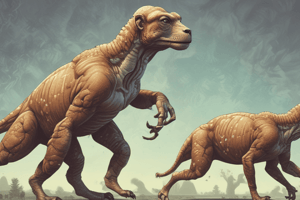Podcast
Questions and Answers
What is the fundamental concept in biology that describes how living organisms change over generations?
What is the fundamental concept in biology that describes how living organisms change over generations?
- Natural Selection (correct)
- Genetic Reproduction
- Environmental Adaptation
- Phenotypic Variation
Which mechanism leads to the persistence and spread of favorable traits across populations?
Which mechanism leads to the persistence and spread of favorable traits across populations?
- Natural Selection (correct)
- Gene Flow
- Sexual Reproduction
- Random Mutations
What is the foundation of evolution, arising from random mutations, gene flow, and sexual reproduction?
What is the foundation of evolution, arising from random mutations, gene flow, and sexual reproduction?
- Speciation
- Adaptation
- Genetic Variation (correct)
- Phenotypic Diversity
In biology, what occurs when genetic changes confer advantages to individuals, enhancing their survival and reproductive success?
In biology, what occurs when genetic changes confer advantages to individuals, enhancing their survival and reproductive success?
Over thousands of generations, advantageous traits accumulate, leading to evolution at both macroscopic and microscopic levels. What is this accumulation called?
Over thousands of generations, advantageous traits accumulate, leading to evolution at both macroscopic and microscopic levels. What is this accumulation called?
Which biologist famously captured the principle of natural selection in his work On the Origin of Species?
Which biologist famously captured the principle of natural selection in his work On the Origin of Species?
What type of patterns does macroevolution deal with?
What type of patterns does macroevolution deal with?
How do modern evolutionary theories establish their validity?
How do modern evolutionary theories establish their validity?
What is a key requirement in writing about evolution in the modern biologist's lexicon?
What is a key requirement in writing about evolution in the modern biologist's lexicon?
What kind of studies help bolster confidence in the role of evolution in shaping the biosphere?
What kind of studies help bolster confidence in the role of evolution in shaping the biosphere?
What do successful biologists employ in their work according to the text?
What do successful biologists employ in their work according to the text?
Which type of records are investigated to uncover stories of lineages evolving over enormous spans of geological time?
Which type of records are investigated to uncover stories of lineages evolving over enormous spans of geological time?
Flashcards are hidden until you start studying
Study Notes
Exploring Evolution through the Lens of Biology
Evolution, a fundamental concept in biology, describes how living organisms change over generations due to genetic variation and natural selection. To gain insight into the processes driving this transformation, let's delve into various aspects of evolutionary theory, following established principles in biology research.
Natural Selection
Natural selection refers to a mechanism where favorable traits persist and spread across populations because individuals bearing these characteristics have higher survival rates and reproduce more prolifically. Charles Darwin famously captured this principle in his seminal works On the Origin of Species.
Genetic Variation
Genetic variation forms the foundation of evolution, arising from random mutations, gene flow among populations, and sexual reproduction. These variations lead to phenotypic diversity, essential for natural selection to take effect.
Adaptation Through Time
Adaptation occurs when genetic changes confer advantages to the bearers, increasing their ability to survive and reproduce in changing environments. Over thousands of generations, these advantageous traits accumulate, leading to evolution at both macroscopic levels—speciation events resulting in new species—and microscopic ones, such as alterations in individual genes.
Macroevolution
Macroevolution deals with larger-scale patterns of evolution, such as speciation events and mass extinction episodes, providing insights into the emergence and decline of groups of related organisms. By investigating fossil records and phylogenetic trees, we uncover stories of lineages evolving over enormous spans of geological time.
Testability and Empirical Support
Modern evolutionary theories rest upon empirical observations and testable predictions derived from theoretical models. Experiments, comparisons of living and fossil evidence, population genomic studies, and molecular biology techniques bolster the confidence that evolution truly shapes the biosphere.
Writing about evolution in the modern biologist's lexicon typically follows strict formatting rules, such as presenting a clear argument supported by credible primary and secondary resources. Successful biologists employ logical reasoning, critical thinking skills, and adherence to proper grammar, punctuation, and referencing throughout their work.
Studying That Suits You
Use AI to generate personalized quizzes and flashcards to suit your learning preferences.




